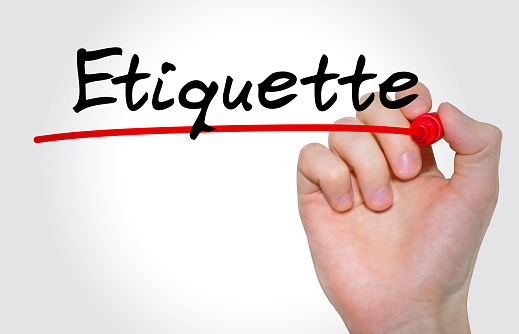The very nature of board meetings requires board directors to participate in discussion, debate and disagreements. The boardroom is the appropriate setting to bring forth diverse perspectives and challenging opinions. Etiquette in board meetings requires board directors to adhere to a high standard of conduct. Meeting etiquette and objectivity join together to create an environment where opposing views can culminate in consensus and the ability for the board to speak with one voice.
Meeting etiquette allows for efficiency in board meetings - an arena where conflict is the norm. Meeting etiquette also ensures that boards observe legal and ethical principles.
Acknowledging the Value of Diverse Perspectives
There are certainly people who enjoy a good argument. Many of those people are able to express their opinions respectfully and actively listen to the opinions of others without criticizing or belittling them. It's also safe to say that a small number of people enjoy arguing just for the sake of arguing. Diverse perspectives in the boardroom are productive when board directors enjoy a sense of trust and can expect acceptance and cordiality from their peers, who may disagree with their perspectives. The New Yorker business columnist and author of The Wisdom of Crowds, James Surowiecki, states, ''Diversity and independence are important because the best collective decisions are the product of disagreement and contest, not consensus or compromise.'' Surowiecki's philosophy is that numerous minds working together are exceptionally accurate when they come together for the purpose of answering and solving certain types of questions and problems.Board Meeting Etiquette Before Meetings
Meeting etiquette is important during meetings, but it actually begins before the meeting is called to order. Board directors should demonstrate that they came to the meeting prepared to work by arriving early. Take a few minutes to use the restroom, get a glass or a bottle of water, choose a seat, and open up the board book and other materials. Agendas are nearly always sent out ahead of time. Board directors should be sure to review the agenda and any reports or other materials and become familiar with the agenda items, so they will be prepared to ask questions, make comments and participate productively in discussions. Conducting a thorough review of the agenda also gives board directors time to request additional materials in advance of board meetings, if needed. In an article titled, ''Boardroom Etiquette,'' author Amy Palec suggests that boards set up a website where they can log on and view the upcoming agenda, review past meeting minutes and RSVP for the meeting. While a website is a good thought, board directors will get more value from a board management software system such as Diligent's Governance Cloud. Governance Cloud is an online space where boards can conduct virtually every aspect of board service within the high level of security that today's boards require. Governance Cloud is composed of an entire suite of governance tools that are fully integrated for a total Enterprise Governance Management System. Palec recognized that an online platform for boards makes every board director accountable for reviewing the agenda for board meetings and arriving on the day of the meeting well prepared.Board Meeting Etiquette During Meetings
Board directors can expect much of the same etiquette that individuals would expect at any other meeting. As a normal protocol, the board chair might remind board directors to silence their cell phones during the meeting and only take a call if there's an emergency. Board directors should comply with company policies regarding using electronic devices, such as laptops or tablets, during board meetings. Some meetings require board members to access their board books online during the meeting. Others disallow laptops and tablets because the clicking of keys is a distraction. Again, board policy indicates whether boards allow members to use audio or video recording during board meetings. The board chair may allow exceptions to policy under certain circumstances and if the board concurs with the reason. Board directors should follow the agenda and check off items as the board addresses them, being sure to focus on the current agenda item being discussed. Members of board meetings, including guests, should refrain from distractions such as drumming fingers on the table, tapping their pens or fidgeting in their seats. Latecomers should not expect the board chair to stop the meeting and brief them on the items they missed, which disrupts the meeting's momentum and wastes time. All members should plan to stay for the entire meeting unless it's absolutely necessary to leave early. Any board member who has a conflict of interest when an agenda item is being addressed should declare the conflict and abstain from voting. The minutes should reflect any votes where a member abstained from voting due to a conflict of interest. During the course of board discussions, board members should direct comments through the board chair and wait to be recognized to speak. It's most beneficial to ask only one question at a time and to state the question clearly and concisely. Listen carefully to other board members' opinions and don't interrupt them, just as you expect them to listen to your point of view. Respond only with constructive criticism and comments. Try to be as objective as possible when considering the pros and cons of issues. Getting stuck on an issue only causes it to resurface meeting after meeting. Be aware that disagreements may erupt, and tempers may flare. Remember that conflicts are a necessary product of reaching a consensus. Try to keep emotion out of it as much as possible.Board Meeting Etiquette After Meetings
Board members should respect the confidentiality and sensitivity of board discussions. Board members should remain loyal to board decisions even if they voted against them. It's bad practice and bad etiquette to attempt to come to a consensus outside of a board meeting or to try to dissuade other members from an official vote they took during a meeting. A consensus means that all board members have responsibility for the collective decision. Boards that acknowledge and practice etiquette for board meetings will establish mutual trust and respect for the process, as well as for each other. Boards should add the topic of board conduct to their annual board evaluations, so they are aware of the board's health related to their behavior. As with any situation where volatility is inherent, apologies at board meetings are always in order.
Media Highlights
Environmental, social and governance (ESG) issues have become more complex and multifaceted than ever before. At the same time, ESG continues to ascend on board and leadership agendas.
In this buyer’s guide, we explore what a market-leading ESG solution should look like and highlight the key areas organisations should be prioritising as they embark on their search.




